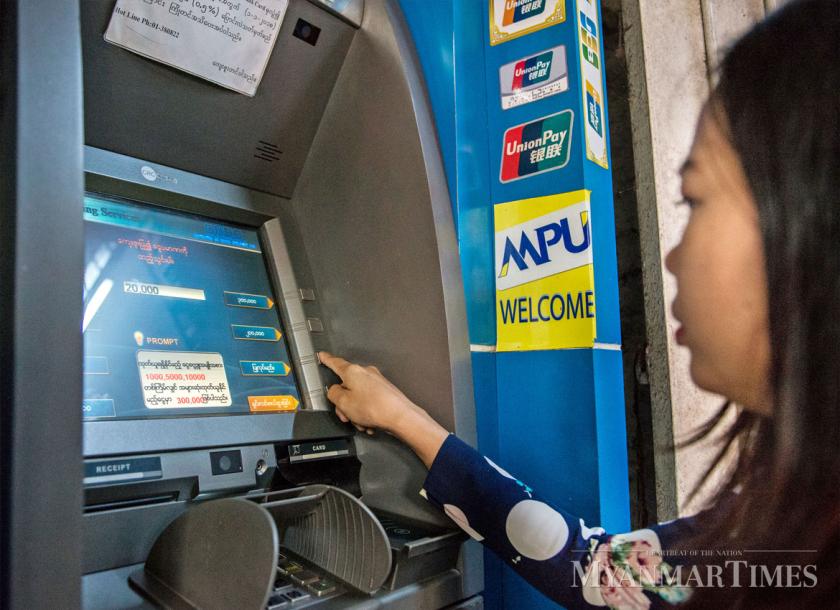According to the experts, Myanmar will take at least five more years for society to make electronic payments, i.e. to go cashless, across the country
10 กันยายน 2561
Myanmar’s cash dependent economy has become a burden on the government’s coffers in recent years and a widespread adoption of an electronic payment system in the country is needed. Yet, experts say it could take a minimum of five more years for society to go cashless.
“It costs the government money to print cash and produce coins and this amount is quite a lot. There are also other costs involving transporting the money to various banks across the country,” said U Zaw Lin Htut, CEO of Myanmar Payment Union (MPU).
Meanwhile, it is getting more difficult to monitor the growing volume of cash flows related to tax and licensing matters at government departments. “All that leads to unnecessary cases involving corruption. For citizens, fake cash notes and damaged money are also a problem,” said U Zaw Lin Htut.
In that light, it’s crucial for Myanmar to have an electronic payments system, said economist Dr Naing Koko. “And depending on how soon we can get that operational, it would the starting point for a wave of development and growth for the economy. This is what we’ve seen take place in many other countries,” he told The Myanmar Times.
Digital adoption
Although progress has been slow, Myanmar has not been idle on the digital front. Things first started moving in 2012, when local banks were authorised to distribute MPU ATM cards to their clients.
Since then, the banks have also launched e-payment services such as CB Pay, KBZ Pay, AGD Pay and MAB Mobile bank to make the payments process more convenient and efficient. Meanwhile, a slew of mobile money operators such as Wave Money, M-Pitesan, TrueMoney and OK Dollar have also emerged.
Yet, adoption rates have been low outside Yangon. Currently, only establishments that deal with tourists have embraced e-payments. These include all 5-star hotels, large malls and supermarket chains like City Mart, some restaurants and tour agencies and up to 90 percent of the shops at Bogyoke Market in downtown Yangon offer electronic payment services.
More recently, governmental departments have also come onboard. The Directorate of Investment and Company Administration (DICA), on August 1 launched its new MyCo online system under which companies are now expected to register and pay fees. For the month of August, DICA collected more than K100 million in registration fees through the MyCo system.
Now, the Ministry of Labour, Immigration and Population is preparing a system under which its individual identity card system will be put online. Meanwhile, the Internal Revenue Department is looking to implement an e-system so taxpayers can pay taxes online.
The Yangon regional government has also been trying to implement a card-payment system for bus fares since the start of this year. Since the launch of the new Yangon Bus System last year, commuters face the inconvenience of having to ensure they have small change before they can pay the fare to get onboard.
“If you don’t have any change, you’re going to have trouble riding the bus. It’s not convenient at all to have to ask for change from the next passenger who gets on. I want the card payment system which I’ve been hearing about for a quite a while to be quickly implemented,” said 26-year-old Ma Thidar Lwin, who commutes daily via public transport.
Five more years
But that’s just the tip of the iceberg and there is still a lot to do to get the whole country onboard.
“People here like to hold cash and don’t believe in technology. This tradition is hard to change. We need to change this mindset and convince people that technology makes it more convenient to make payments,” said Daw Khin Ma Ma Moe, vice chair of the Myanmar Agriculture Bank’s marketing department.
In fact, it could take at least another five years for the concept of e-payments to gain widespread acceptance, said U Zayar Aung, head of the card department at CB Bank. “It will take time to gain the public’s trust,” he said.
Meanwhile, banks still face challenges in rolling out e-payment services, such as investing in the right technology. “It costs a lot to support those technological needs and unlike in other countries, local banks are unable to spend millions of dollars on software. There are also other factors such as erratic internet service and power supply. All the banks rely on generators when electricity is unavailable. So it actually costs more to implement the system here. Local banks have been working amid a lot of challenges so the progress will be slow,” said U Than Lwin, senior adviser to KBZ Bank.
But the process could be faster if the government gets onboard. “In India, for example, the government stopped distributing large denomination bank notes and had those amounts transferred onto a bank card. As only smaller denomination notes could be accepted, people eventually stopped using notes to transact and embraced a cashless system,” U Zayar Aung said.
U Zaw Lin Htut added that “to implement a cashless culture, everyone, including people from the rural areas, must be onboard. So, the government has to set the right policy. If there are rules stating that e-payments will be accepted in the business licence approval process, for example, the shift away from using cash can be achieved much faster,” he said.
On balance, reducing the use of cash is beneficial for both the government and citizens and also helps in the development of businesses. But citizens’ trust, support from the government as well as better access to electricity and internet is required to sustain Myanmar’s push to go cashless.
(The Myanmar Times: https://www.mmtimes.com/news/least-five-more-years-needed-myanmar-go-cashless.html )











